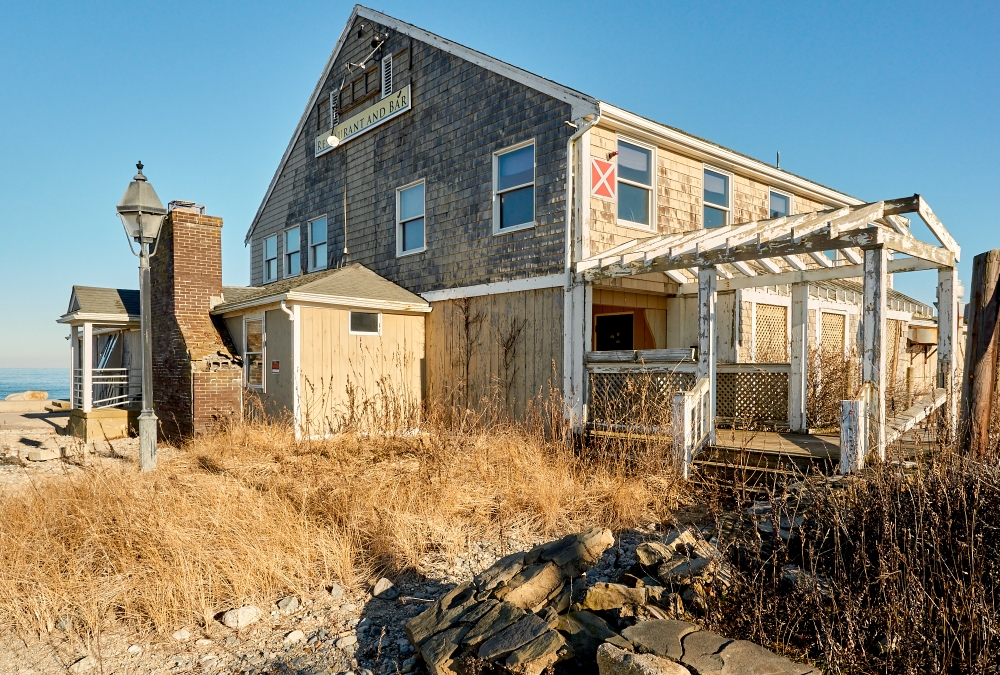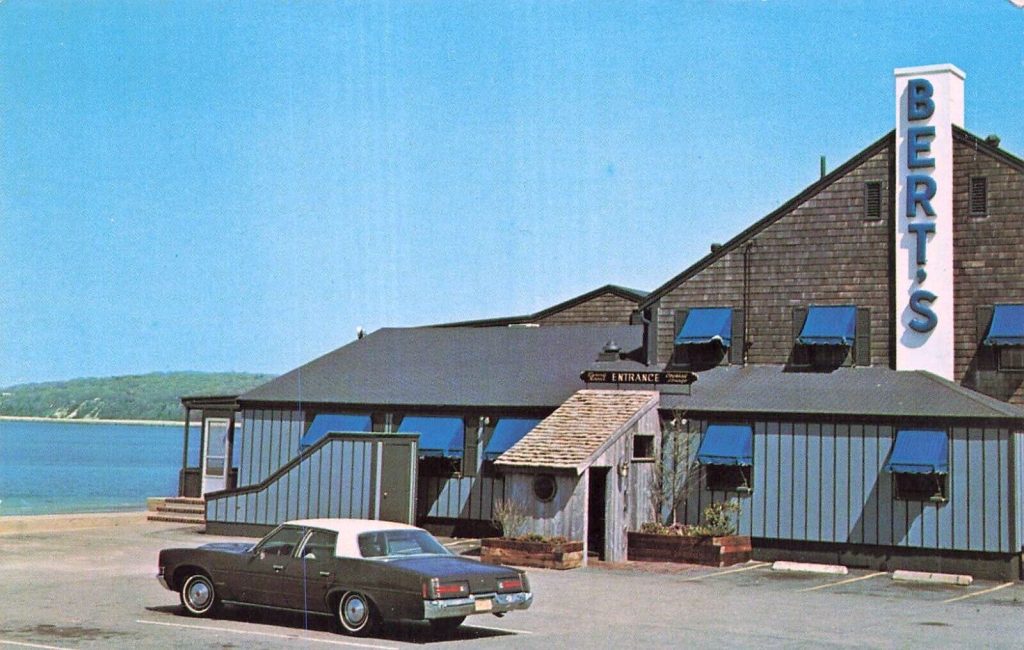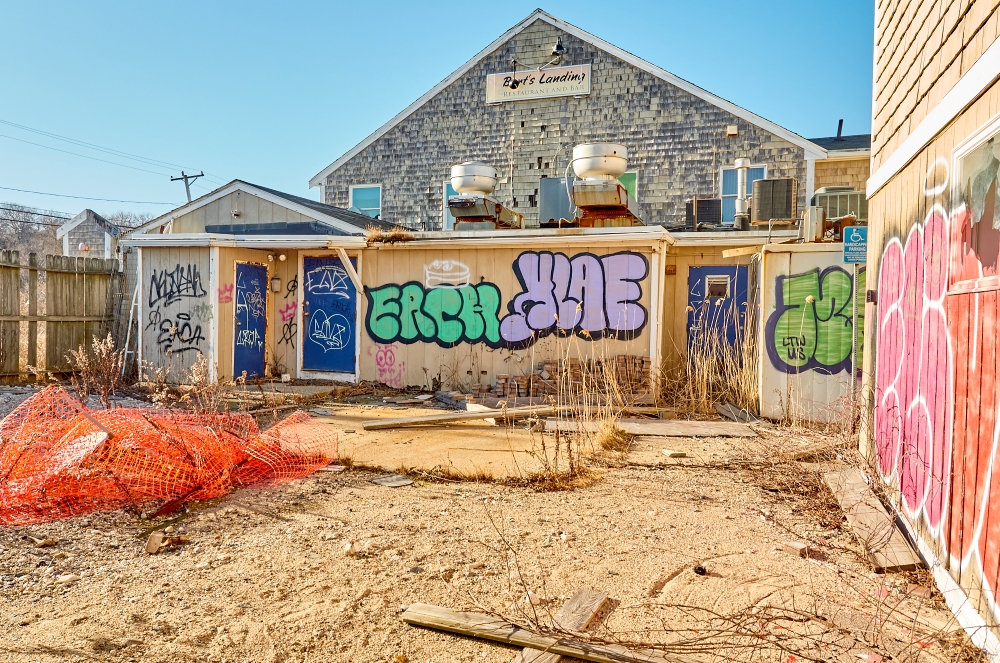The deteriorating hulk of a restaurant on Warren Avenue that longtime residents still call Bert’s seems to defy real estate logic.
It’s a waterfront site with parking, at the entrance of a popular public beach, across the street from a national tourist attraction. It should be prime real estate, with developers lining up to build there. But no.
“It’s the property I get the most calls about. It’s a blight on the area,” said Town Manager Derek Brindisi.
Brindisi said people often call asking why the town can’t do something about the eyesore. He also hears from investors interested in redeveloping the site, but they can’t reach the owners, even though a “for lease” sign with a phone number sits out front.
The building has been vacant since 2013, pummeled by wind and waves. But a change may be in the forecast.
“This is a priority,” Michael Psikarakis, part of the property’s ownership group, said by text. “We are looking forward to redeveloping the property and creating a landmark waterfront destination.”
Last fall, Brindisi and Lee Hartmann, director of planning and development, met with the owners to talk about the property. They discussed “conceptual plans” for a new restaurant and retail space. “We’ve made the point to the owners, multiple times, that it is a priority for the town to see something done,” Hartmann said.
Since that meeting, however, there’s been no follow-up from the owners, Brindisi said.

The beachfront location has nearly 100 years of history as a restaurant. Albert “Bert” Boutin of Plymouth bought the land in 1930 and opened Bert’s Lobster Shack. He ran it for 30 years, with success leading to construction of a larger full-service restaurant and lounge on the site, simply called Bert’s.
“Bert’s was the place to be in those days,” said lifelong Plymouthean Jerry Sirrico. “The food was great. The lounge upstairs was fun. It was tough to get in there a lot of nights.”
Boutin sold the restaurant and real estate in 1961 to Cyril and Caroline Wade of Kingston, whose son Robert “Bobby” Wade managed Bert’s during its heydays in the 1960s and early 1970s.

The Wades sold in 1975, and with new ownership and a new menu, business began to wane. The building was heavily damaged in the Blizzard of ’78, but repairs were made and it remained open until 1990, when the company that owned it at the time filed for bankruptcy and the bank foreclosed on the property.
Enter George Demeter.
A native of Greece, Demeter was a self-made Boston real estate developer and co-founder of the Mercantile Bank and Trust Company. He also had a summer home in the Manomet Bluffs section of Plymouth. Demeter is said to have enjoyed many meals with friends and family at Bert’s and was sad to watch its demise.
Demeter bought the property in 1994 from the Federal Deposit Insurance Corp., which had taken control after the Plymouth Five Cents Savings Bank, which had foreclosed on the property, failed in 1992.
The building was renovated and Demeter leased it to a series of restaurateurs who operated under the names Bert’s, Stoneforge Plymouth, Bert’s Landing, and Bert’s Cove. None of them matched the success of the Boutin/Wade era.
Demeter died in 2015. The property is now owned by a trust controlled by his heirs. Psikarakis is Demeter’s son-in-law. The Psikarakis-Demeter family also controls A.F. Doyle & Company, the Boston real estate firm that placed the “for lease” sign on the property.

Select board member Harry Helm lives in Manomet and drives by the site almost every day. “I just shake my head because I am saddened by it on many levels,” Helm said. “My family is from Kingston and I have fond memories of going to Bert’s as a child. Now, as a resident and elected official, I’m sad about the impact that property is having on the community.”
Helm’s day job is in real estate and he agrees that, in theory, it’s a desirable waterfront location. But new development there will challenging, Helm said, because of the growing impact of sea-level rise and stronger ocean storms.
“If money were no object, I would like to see the town buy it for the public purpose of adding it to Plymouth Beach. But of course, money is always an object,” Helm said. “So, we have to figure out a path forward.”
The restaurant building and parking lot are assessed by the town for $1.35 million. This year’s property tax bill is $17,306. The owners are current with their property taxes, and there is a persistent rumor around town that they have purposely kept the property vacant, and let it deteriorate, to reap a large income tax write-off based on their losses at the site.
“Those are just poor assumptions. Nothing could be further from the truth,” Psikarakis wrote. “These types of projects take time. Unfortunately, Covid caused some setbacks. However, we are excited to be actively working towards developing this landmark location.”
As for next steps, the town is waiting for more specifics from the owners.
“I am thrilled to hear they have redevelopment plans,” Helm said. “I will be more thrilled when they actually put them on the table in front of us.”
Michael Cohen can be reached at michael@plymouthindependent.org.

